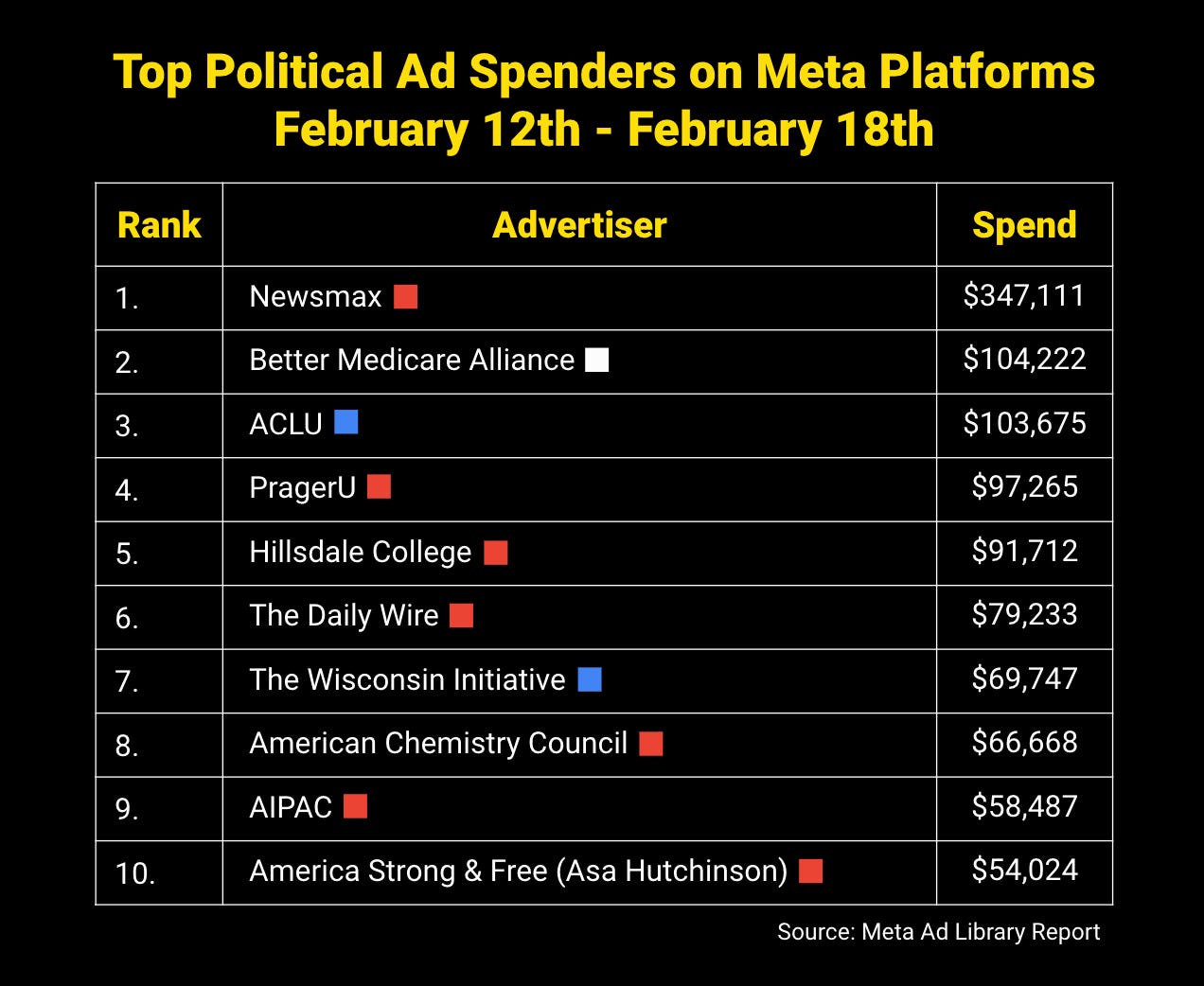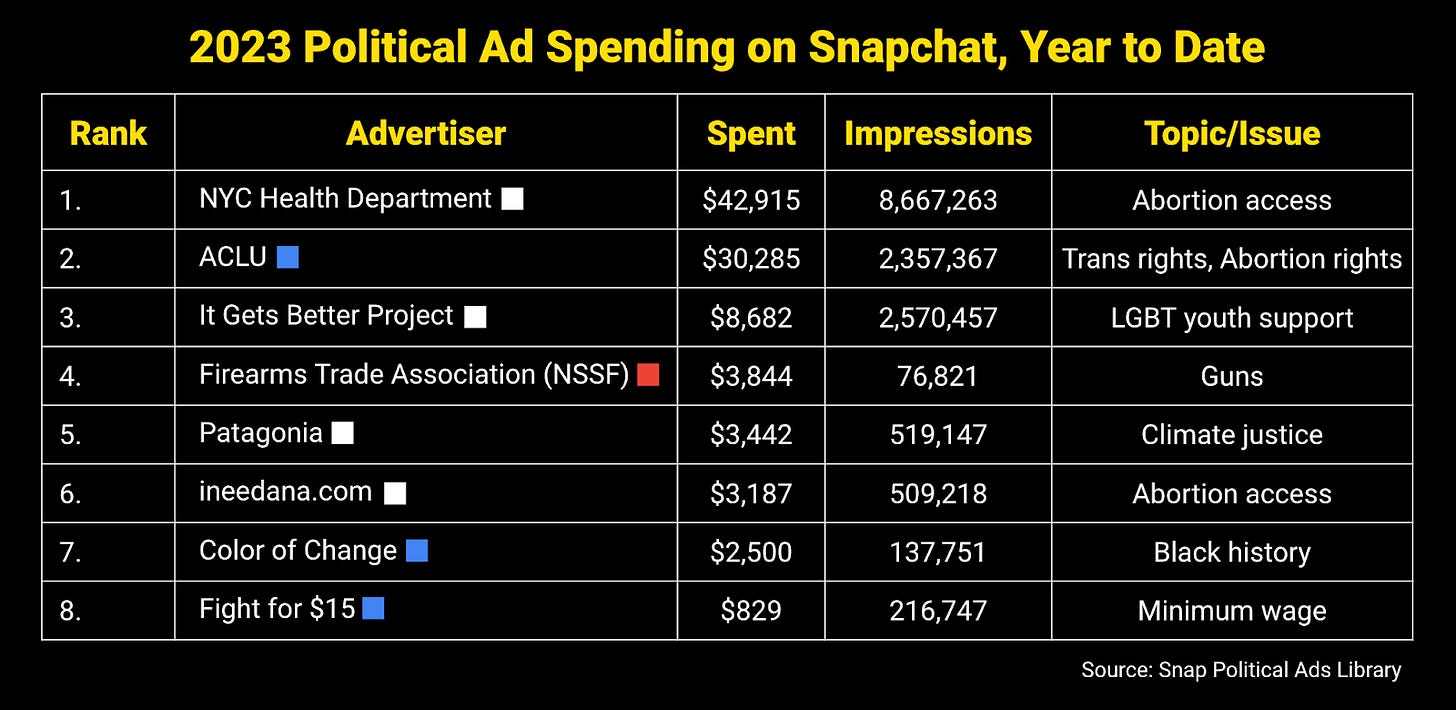Gmail creates online fundraising “apocalypse”
Campaigns and consultants are furious after the company ended a special anti-spam filter program for political email with little notice
Last fall, Google’s Gmail created a special program allowing political fundraisers to bypass spam filters if they met certain qualifications and adhered to a set of industry standards. When that program ended on January 31st, the major campaigns that were enrolled saw their email deliverability plummet and online fundraising shrink. I’ll share more on the mini political fundraising “apocalypse” below, but first…
By the numbers
FWIW, here were the top-spending political advertisers on Facebook + Instagram last week:
Sen. Kyrsten Sinema launched her first fundraising ads on Facebook since leaving the Democratic party, indicating that she’s gearing up for what is expected to be a tough, three-way re-election fight.




Pro-Israel organization AIPAC, consistently a top spender on Facebook advertising, is running ads attacking another pro-Israel organization, J Street. AIPAC notoriously continued to support insurrectionist members of Congress after January 6th, while J Street aligns with more progressive politics.
Meanwhile, here were the top-spending political advertisers on Google and YouTube last week:
The majority of Google ad spending last week took place in municipal or special elections. Progressive Rep. Chuy Garcia is attempting to unseat Chicago Mayor Lori Lightfoot in next week’s election, and a pro-Garcia group is up with new YouTube ads focused on crime and public safety:
…and here’s a quick look at political ad spending on Snapchat, year-to-date.
Think about upgrading your subscription!
As 2024 kicks into gear, FWIW is providing unique data and insights you can’t get anywhere else. Although this week’s issue doesn’t have a paywall, I plan to make a lot more content available to premium subscribers only in order to sustain this work. It’s only $5 a month or $50 a year to upgrade, and that gives you access to fully-paywalled newsletters and a special Tuesday news round-up. It also means that you’ll help keep this content flowing through the next election cycle. Hit the button below to learn more:
From around the internet
Twitter released a robust political ad disclosure process where users can filter and view political ads on the platform and who they’re targeting. Just kidding, its more worthless garbage from Elon Musk >>
Montana Sen. Jon Tester is officially running for re-election, and his campaign sent this amazing fundraising text to supporters.
On Tuesday, voters in Wisconsin headed to the polls in a high-stakes primary election for a state Supreme Court seat. Democrats and their allies flooded the internet with ads in the four-way, officially nonpartisan race, and now one liberal justice and one conservative justice are set to head to a runoff in April.
2024 Dispatch
Here’s how much money likely or confirmed 2024 presidential candidates have spent on Facebook + Google ads to date (1/1 - 2/18):


It’s been an incredibly busy week for the 2024 “pre-campaign.” Here are four little pieces of news that FWIW broke this week:
Nikki Haley still hasn’t released her fundraising numbers. As one strategist put it, “If they have numbers to be proud of, they’d share. Especially underdog campaigns.”
South Carolina Sen. Tim Scott began targeting Iowans on Facebook with an inspirational video as part of his “Faith in America Tour.”
Troll-in-chief Donald Trump continues to geo-target Nikki Haley’s events highlighting her past remarks in support of his 2024 candidacy, going as far as lying about her current support for his campaign.
…and Ron DeSantis started geo-targeting liberal big cities (Chicago, Philly, New York) with a “law and order” message on Facebook, part of a Blue State Tour and publicity stunt.
Gmail creates online fundraising “apocalypse”
Last fall, in the midst of a protracted legal fight with the Republican National Committee, Google created a special program for campaigns and organizations looking to send political fundraising emails. The Verified Sender Program (VSP) would allow responsible campaigns that abide by certain standards and qualifications to enroll in a program that would help them bypass Gmail’s spam filters.
The VSP ran from late September 2022 until January 31st of this year, and although the RNC chose not use it, over 100 major campaigns eventually enrolled. In order to join, eligible campaigns had to abide by certain standards and flip some technical switches. Political campaigns who joined - and the consultants running their email programs - immediately saw a major boost in Gmail open rates, overall list growth, and as a result - grassroots donations raised.
“It was a really big benefit, and allowed us to reach a larger pool of Gmail users than we were able to previously,” said Damien Shirley, Email Director at Democratic digital firm Middle Seat. “It became pretty common for some of our programs to have open rates in the 30% range, which allowed us to raise more money from folks on Gmail.”
I spoke with consultants from three other leading Democratic digital firms for this story. “Awesome,” “incredible,” and “unbelievable” were all used to describe their temporary boost in fundraising metrics through the program.
But on January 24th, Google announced via an AXIOS story that the program would come to an end one week later. One top email strategist was peeved that they had to initially hear about the program’s end from a news report, and not directly from the company or its representatives. January 31st would be VSP’s last day.

Another digital fundraising consultant I spoke with said that on that day, one of their major clients had been averaging a respectable Gmail open rate of around 20%. Immediately over the next four days, every email sent was opened by less than 1% of Gmail recipients. Those results were far worse than the campaign’s previous open rates before VSP enrollment. “The difference was night and day.”
Other strategists I spoke with said their experiences were generally less dire but echoed those results - their Gmail deliverability plummeted after the program’s termination, in some cases to levels worse than the pre-VSP days. One jokingly referred to it as the “VSPocalypse.” Avoiding spam filters and optimizing email deliverability have long been central to online political fundraising. In this case, it's unclear why these campaigns would be faring worse than they did before VSP.
In the meantime, fundraisers don’t have a lot of options. Gmail is the preferred email client of a majority of Americans, and political campaigners find themselves working at the whims of the company’s policies and filters.
“It speaks to a larger point in our industry,” says Brennan Balasubramaniam, Associate Email Director at Democratic firm Authentic. “The fact that Gmail can make changes with the switch of a button and in the blink of an eye we see such a strong source of fundraising be impacted is a little concerning.”
Most say they’ll try to continue to focus on the basics of email deliverability while pressuring the company to respond with better solutions. “This has a real-world impact - particularly on House and Senate campaigns’ ability to reach small-dollar donors,” says Shirley.
It’s not just consultants - even U.S. Senator Chris Murphy (D-CT) weighed in this week, sharing his take that “it’s a giant assist from Google to the billionaire class.”
That’s it for FWIW this week! If you enjoyed reading this issue, give it a share on Twitter.
Have a tip, idea, comment or question? Shoot me a reply and I promise to respond to every email.









What happened to " Do No Evil. "?